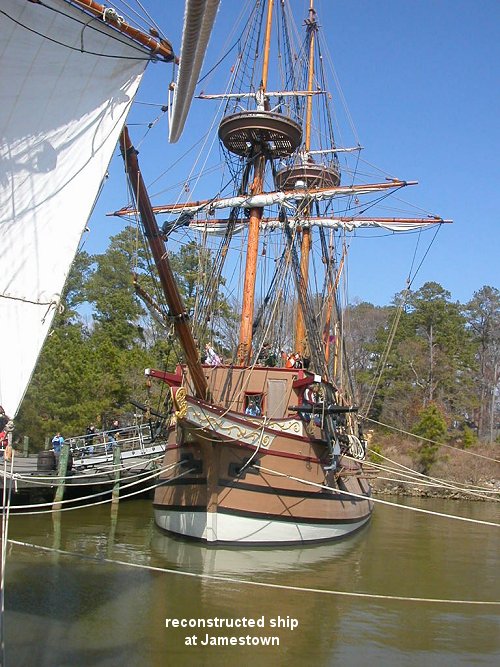
reconstructed English ship at Jamestown

reconstructed English ship at Jamestown
The English settlement at Jamestown was a failure initially. The Virginia Company generated no profits for the venture capitalists in London. By March 1610 Powhatan had almost succeeded in extracting resources from the English before expelling them from his territory. Powhatan's political and military skills are rarely acknowledged today, but his manipulation of the Europeans was masterful. In 1610, the English abandoned Jamestown after three years and sailed down the James River.
In three years of settlement, the English had discovered none of the gold and silver than Spain had acquired from their conquests in the Caribbean and South America. Nearly 90% of the settlers who had arrived had died, and there was no economic incentive for staying. The colony was based on hopes for economic gain, not visions of religious or political freedom,. No one was getting rich; the settlers could not even support themselves.
In October, 1609, hundreds of new colonists arrived at Jamestown, but a storm had shipwrecked the
The This Supply colonists arrived at the end of Summer, 1609 without sufficient supplies for surviving until the next harvest. Powhatan recognized the English were in trouble, and he blocked the Native Americans from trading corn. The strongest colonial leader, John Smith, returned to England in ctober 1609 after a bag of gunpowder exploded on his thigh and wounded him.
Virginia was experiencing the worst drought of the last 400 years. Powhatan may have had little surplus food anyway, but he ensured that the English colony suffered severely. During the "Starving Time" of the 1609-10 winter, the colonists even turned to cannibalism, as described later by John Smith:1
Only the timely arrival of Lord De la Ware stopped the abandonment of Jamestown. The colonists returned to their settlement and started over. De la Ware himself returned to England a year later, his health damaged by the bad water and disease in the Virginia climate. His name was applied to the first large river entering the Atlantic Ocean north of the Chesapeake Bay - and later, of course, to a state.
The English were more concerned with the threat from the Spanish than the Native American. The first English settlement was at Jamestown, far upstream of the natural harbor at Norfolk, to avoid the Spanish. Powhatan welcomed the English, then "milked" them for iron, firearms, and luxury goods such as beads and copper.
When the three English ships arrived at Jamestown, Powhatan did not eliminate their settlement immediately. The English offered him a chance to acquire technology, especially metal tools that were otherwise unavailable. Prior to 1607, the Powhatans had acquired only a few bits of iron from European sailors, the failed Spanish settlement in 1570, and perhaps from the "lost colony" of Roanoke. The Powhatans had acquired some native copper through trade connections that extended as far as the Great Lakes, but it was only suitable for ornamental purposes.
Iron tools were far better than bone and stone, and worth the small loss of land at Jamestown. The Paspaheghs that had controlled the location of the English fort, and the other tribes who lost specks of land at the Falls of the James and at the tip of the Peninsula, could clear new fields with minimal effort in comparison.
Powhatan successfully blocked the English from trading with his enemies west of the Fall Line, the Manahoacs and Monacans. He eliminated the Chesapeakes and Kecoughtans, and acquired control over the Chickahominies. By keeping the English isolated (in most cases) from rival tribes, Powhatan ensured that he would profit from whatever resources they had brought to his territory. The Iroquois tribes in New England used the same technique with the English colonists in Massachusetts, controlling the fur trade and blocking English attempts to deal directly with tribes west of the Hudson River.